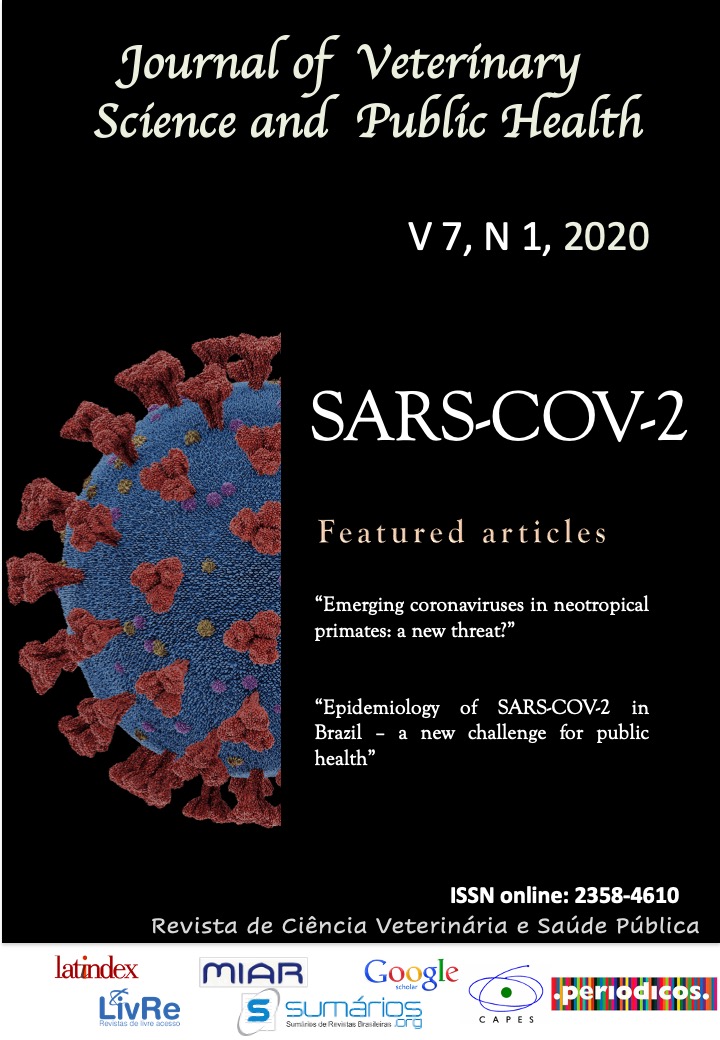COVID-19 IN PETS, WHAT DO WE KNOW?
Resumo
The COVID-19 caused by the coronavirus 2 severe acute respiratory syndrome (SARS-CoV-2), was first reported in Wuhan, China, starting an outbreak that affected countries around the whole world. The disease leads to simple clinical signs, such as colds common to more serious conditions as pneumonia and severe respiratory insufficiency. It is assumed that the agent was originated from bats in China, considering its as natural reservoirs, however, this relationship is still being investigated, as well as the possible intermediate hosts. Little is known about the relationship of animals with the disease epidemiological cycle, however, until now, the human transmission to companion animals and vice versa, is not yet evidenced. Nevertheless, some care must be considered if the tutors are infected by the disease.
Downloads
Referências
ALMENDROS , A. Os animais de companhia podem ser infectados com Covid-19? Registro Veterinário. 2020 186, 419-420.
Animal Veterinary Medical Association. SARS-CoV-2 in animals, including pets Disponível em:
BROWNLIE J, SIBLEY D. What can animal coronaviruses tell us about emerging human coronaviruses?. Vet Rec. 2020;186(14):446‐448. doi:10.1136/vr.m1463
CADDY, S. L. Can cats really get or pass on COVID-19, as a report from Belgium suggests? The conversation. Disponível em:< https://theconversation.com/can-cats-really-get-or-pass-on-covid-19-as-a-report-from-belgium-suggests-135007>. Acesso em: 17 de abril. 2020
Centers for Disease Control and Prevention. Coronavirus Disease 2019 (COVID-19). Disponível em:< https://www.cdc.gov/coronavirus/2019-ncov/daily-life-coping/animals.html?CDC_AA_refVal=https%3A%2F%2Fwww.cdc.gov%2Fcoronavirus%2F2019-ncov%2Fprepare%2Fanimals.html>. Acesso em: 16 abril. 2020.
CHEN, N.; ZHOU, M.; DONG, X.; QU, J.; GONG, F.; HAN, Y.; QIU, Y.; WANG, J.; LIU, Y.; WEI, Y.; XIA, J.; YU, T.; ZHANG, X. & ZHANG, L. Características epidemiológicas e clínicas de 99 casos de 2019 nova pneumonia por coronavírus em Wuhan, China: um estudo descritivo. Lancet (Londres, Inglaterra). 2020. 395 (10223), 507-513. https://doi.org/10.1016/S0140-6736(20)30211-7
Conselho Federal de Medicina Veterinária. Serviços veterinários essenciais permanecem disponíveis à população durante a pandemia do coronavírus. Disponível em :
GRUBER, A. Covid-19: o que se sabe sobre a origem da doença. Jornal da USP. Disponível em:< https://jornal.usp.br/artigos/covid2-o-que-se-sabe-sobre-a-origem-da-doenca/>. Acesso em: 03 de maio. 2020.
MALLAPATY S. Coronavirus can infect cats - dogs, not so much [published online ahead of print, 2020 Apr 1]. Nature. 2020; 10.1038/d41586-020-00984-8. doi:10.1038/d41586-020-00984-8
MASTERS, PAUL S. "A biologia molecular dos coronavírus". Avanços na pesquisa de vírus vol. 66 (2006): 193-292. 2006 doi: 10.1016 / S0065-3527 (06) 66005-3
SAIF, L. J. Coronavirus can infect cats — dogs, not so much. Nature. 2020; 10.1038/d41586-020-00984-8. doi:10.1038/d41586-020-00984-8
SHI, J.; WEN, Z.; ZHONG, G.; YANG, H.; WANG, C.; HUANG, B.; LIU, R.; ELE, X.; SHUAI, L.; SUN, Z.; ZHAO, Y.; TAN, P.; WU, G.; CHEN, H.; BU, Z.; Susceptibility of ferrets, cats, dogs and other domesticated animals to SARS–coronavirus 2. Science 2020; doi: 10.1126/science.abb7015
SINGHAL, T. Uma revisão da doença de Coronavírus-2019 (COVID-19). Indian J Pediatr 2020. 87, 281-286. https://doi.org/10.1007/s12098-020-03263-6
SUN, J., HE, WT, WANG, L., LAI, A., JI, X., ZHAI, X., LI, G., SUCHARD, MA, TIAN, J., ZHOU, J., VEIT, M., & SU, S. COVID-19: Epidemiologia, Evolução e Perspectivas Transdisciplinares." Tendências em Medicina Molecular. Março de 2020, doi: 10.1016 / j.molmed.2020.02.008
World Animal Protection. Should I worry that my dog has coronavirus? Disponível em:
World Health Organization. Q&A on coronaviruses (COVID-19) Disponível em:< https://www.who.int/news-room/q-a-detail/q-a-coronaviruses>. Acesso em: 15 de abril. 2020.
World Organization for Animal Health (OIE). Questions and Answers on the 2019 Coronavirus Disease (COVID-19) Disponível em:
WU, F., ZHAO, S., YU, B., CHEN, Y. M., WANG, W., SONG, Z. G., HU, Y., TAO, Z. W., TIAN, J. H., PEI, Y. Y., YUAN, M. L., ZHANG, Y. L., DAI, F. H., LIU, Y., WANG, Q. M., ZHENG, J. J., XU, L., HOLMES, E. C., & ZHANG, Y. Z. A new coronavirus associated with human respiratory disease in China. Nature. 2020; 579(7798), 265–269. https://doi.org/10.1038/s41586-020-2008-3
XU, J., ZHAO, S., TENG, T., ABDALLA, A. E., ZHU, W., XIE, L., WANG, Y., & GUO, X. Systematic Comparison of Two Animal-to-Human Transmitted Human Coronaviruses: SARS-CoV-2 and SARS-CoV. Viruses. 2020 12(2), 244. https://doi.org/10.3390/v12020244








